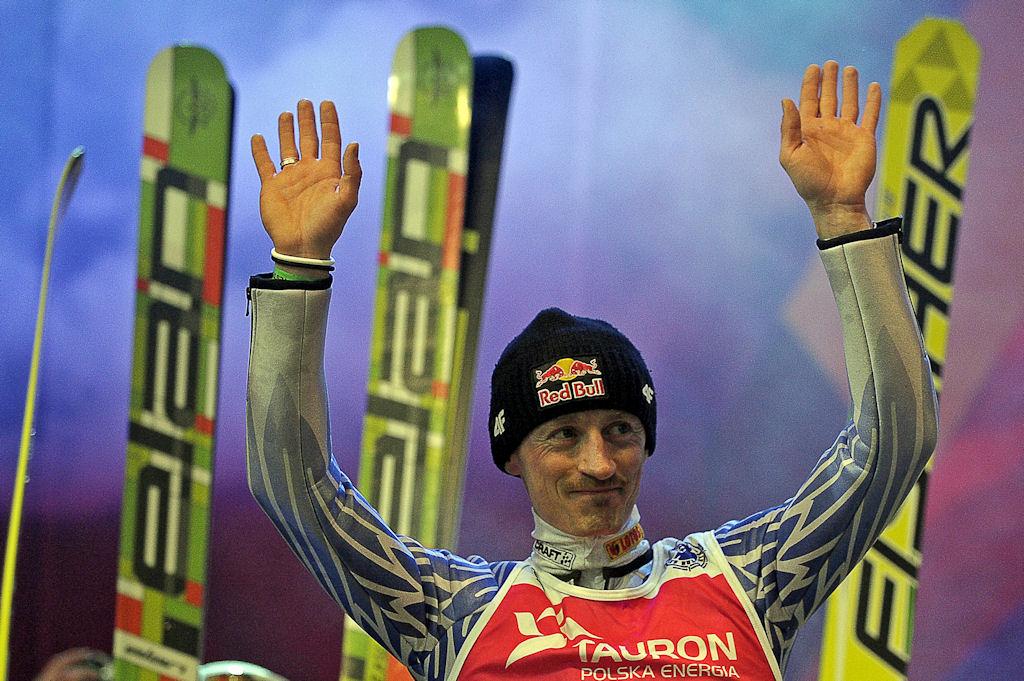With ski jumper Adam Malysz’s retirement, Poles lose a rare international sports star
Polish ski jumper Adam Malysz greets fans during his farewell event in Zakopane, Poland on March 26, 2011. Malysz braved a heavy snowfall, refusing to skip his chance to bow out in the air in his homeland, where he is a sporting icon, despite the poor conditions.
WARSAW, Poland — Adam Malysz's slight frame has borne the sporting dreams of 38 million people.
Malysz became Poland's most beloved sports star when he soared to international fame as one of the world's best ski jumpers. Last month he hung up his skis and retired, leaving a vacuum in a country that has produced few dominant athletes.
Malysz, who won more individual events than any jumper before him — four ski jumping World Cup titles, and medals at two Olympic Games — said that an exhibition event on March 26 at the Polish winter resort of Zakopane would be his last public event. Fans crowded the slopes below the ski jump to bid farewell to a man whose only rival for popularity in Poland is Pope John Paul II.
He became a national idol both because of his international success — something that is rare in Polish sports — and because despite his fame he remained an entirely normal small-town boy with an unfashionable moustache.
“You are the realest of Poles,” Donald Tusk, the prime minister, told Malysz during a special reception at his office, during which the reporters and photographers taking part stuck on thin moustaches like the one Malysz sports. “Everyone in Poland loves you so much because you showed us that a Pole can fly high and far, and that was hugely important for us Poles to believe that that was possible.”
Malysz began ski jumping at a slope in his hometown of Wisla, in the southwestern corner of the country, at the age of 6, landing occasionally in his socks because the boots were too big for his feet.
He started jumping on the international circuit in 1995, and a year later broke through to become one of the sport's top jumpers. At the time Poland was emerging from the chaos of its transformation from socialism to capitalism but was still very far behind western Europe. Poles were desperate for a symbol of success who would break through some of the negative stereotypes about their country — and Malysz was their man.
When he won a big international contest in Bischofshofen, Switzerland, he was given the keys to a new Audi. The Swiss official quipped that he might worry about taking the car home because Poland was seen as a hotbed of car thieves. But Malysz fired back that stolen cars were probably not unheard of in Switzerland as well.
He provided an enormous boost to national pride when he won a silver and a bronze medal at the 2002 Salt Lake City Olympics, Poland's first winter Olympics medals in 30 years. Although he never won gold, he again took two medals — this time both silver — at the Vancouver games last year.
Despite Malysz's enormous professional success, which he cleverly parlayed into financial wealth thanks to multiple advertising endorsements, Malysz never lost the homespun touch of a man who had trained to be a carpenter. For the final ceremony marking his departure from the sport, many of the bus drivers shuttling tens of thousands of fans to the mountain resort of Zakopane wore moustaches.
Although over the last 15 years Poland has become much more successful on the international stage, first joining NATO, then the European Union, and is now one of Europe's largest and most successful economies, Malysz remains a rare example of athletic success.
Despite its size, Poland has never managed to cultivate dominance in a sport. The national soccer team is woeful, and few expect it to do well when Poland co-hosts the European championships together with Ukraine next year.
In other sports, success usually comes from the efforts of a single gifted individual with few obvious successors. In motor racing, Robert Kubica is a Formula One driver but no other Poles are close to that ranking. In cross country skiing, Justyna Kowalczyk scoops up medals and titles, but she has no national rivals.
Among the reasons why Poland has not fulfilled its potential, its official sporting institutions tend to be bureaucratic and dominated by cronies who have little interest in promoting their sport. Also, Poland is still a country trying to catch up to western European living standards, and the government has put little money into sports. Unlike governments in places such as Russia and China, Poland's has not seen sporting success as a patriotic calling.
However, there are signs that Poland is beginning to take sports a little more seriously. Tusk, the soccer-mad prime minister, has made it a priority to build soccer fields around the country as a way of fostering youth sports.
And there is some hope that the pattern of one-off success may have changed on the national ski jumping team. In his final official competition on March 20 in Slovenia, Malysz came in third. First place was taken by his teammate, Kamil Stoch.
Every day, reporters and producers at The World are hard at work bringing you human-centered news from across the globe. But we can’t do it without you. We need your support to ensure we can continue this work for another year.
Make a gift today, and you’ll help us unlock a matching gift of $67,000!
